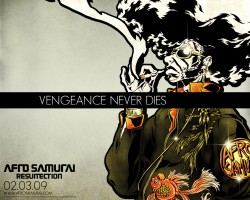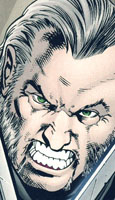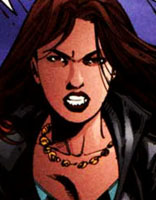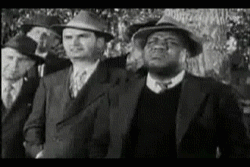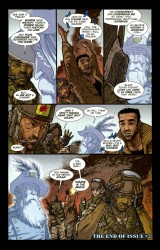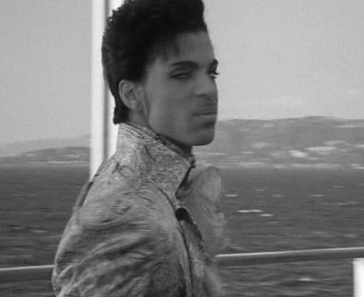
Black History Month ’09 #04: Never No In-between
February 4th, 2009 Posted by david brothersAnyway. New King Kong. It’s not so good. You probably heard that from, y’know, the rest of the world.
They get to Skull Island where savages feed virgins to King Kong. And, while remaining faithful to every aspect of the ’33 Kong, bajillionaire director Peter Jackson populates the place with, as our fisherman in Casanova calls the citizens of Coldheart, “ooga booga bone-nose nigger savage motherfuckers.”
Now, I’m about as sensitive to race issues as the next middle-class white guy. But- really, Peter? Really? That’s the best you could do? You can show us the monkey and the girl ice skating in Central Park but you can’t manage to update the D.W. Griffin-level of stereotypical Savage Nergro Monster? Were there no assistants or friends, colleages or freakin’ P.A.s that took his Grande Hobbitness aside to point out that, hey, maybe we’re spending two hundred million dollars and short of top hats and canes, we’ve just filled Skull Island like it was the Isle of Misfit Al Jolsons?
It wasn’t re-envisioning, re-mastering, reinventing, or re-presenting anything but bigotry; Jackson and co. trucked in racism and wrote it off as an act of fidelity and faithfulness to flawed and ignorant source material.
And anyway it just pissed me off. So when, a few months later, I read about North Sentinel Island for the first time, the two thoughts collided with one another.
Fuck that guy. Here are savages to save the world.
-Matt Fraction, Casanova #5 (back matter)
I can’t help but feel like Matt Fraction, though obviously well-intentioned, missed the point.
Black Panther has Wakanda. Superman’s got Vathlo Island. Tyroc has Marzal Island. Casanova has Coldheart. They all have a few things in common. Remote or isolated countries filled with technologically advanced black people, untouched by the evils of colonialism.
If I had to put my finger on it, I guess it’s born from some kind of political correctness gone wrong. In an effort to avoid creating stereotypical black or African savages, the creators overcorrected in the opposite direction. They put the black characters on a pedestal, turning them into paragons of virtue and exemplars of everything good about humanity.
The thing is, the noble savage portrayal really isn’t better than the ooga booga bone-nose nigger savage stereotype. Both are equally unrealistic. Both of them treat black people as something outside of the norm. “Look! They aren’t stereotypical! They’re super-advanced! They’re sci-fi savages!”
There’s a line from Black Star’s Thieves In the Night that applies here. Mos Def says, “I find it distressing there’s never no in-between- we either niggas or Kings, we either bitches or Queens.” It’s a sign of the gulf between blacks in comics and blacks in real life. You’ve got your unrepentant villain or mugger (more likely the latter) and then you have your heroes, who do it because it’s right.
You don’t have that in-between guy, who tries to be faithful to his girlfriend, but man, he can’t quite make it. You don’t have the girl who strips to pay for her degree in botany. You don’t have that guy who comes home from his high paying job, rolls a blunt, and zones out for a couple hours.
No, you have virtuous-to-a-fault musclemen and super scientists. You have angry black men turned BFFs and haughty queens. You have a bunch of not-stereotypes that end up being just as bad as the stereotypes.
See what I mean?
I think that Casanova is one of the best comics in recent memory, but the Coldheart stuff was pretty eye-rolly. Just another bunch of super savages, here to save us all. Super or not, they’re still savages. Savage or not, they still don’t reflect anything but a distorted view of political correctness.
When Fraction says, “Fuck that guy. Here are savages to save the world,” he basically sums up his motivation for creating Coldheart: revenge on racism. Racism is such an ugly and hated thing that it becomes way too easy to overcorrect. It becomes a battle of extremes. For every bone-nose savage, you create a hyper-advanced doctor. For every street thug, you create a king. For every neck-rolling sass-mouth chickenhead, you make a queen. And in doing so, you get further and further from anything resembling a black experience.
It’s really easy to fall prey to unconscious racism when you’re trying to avenge a racist act. “He’s very well-spoken!” and “You people are all right!” and “All black people aren’t like that!” aren’t racist in and of themselves, but they definitely fall into that realm of “Hang on, what do you mean by that?”
I like a couple of those super savage cultures. Wakanda is pretty awesome, due in large part to Kirby throwing everything at the wall and having it stick, and like I said, I love Casanova. Tyroc’s home is pretty much the only thing I really know about the Legion, because I had a comic with him when I was a kid. Even still, the two extremes are, like most extremes, not reflective of how things really are. If you really want to fight racism, you’ll answer that extreme with something in-between.

